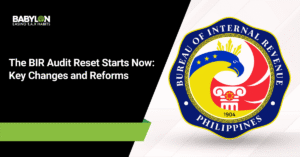A client recently sent a quick question via WhatsApp:
“If I purchase golf club shares under a holding company, is it subject to VAT?”
It’s a great question. It’s one that many business owners and investors might also be wondering about. The short answer?
It depends.
According to B.E.T.H. AI, which referenced tax regulations, purchasing golf club shares may be classified as a financial service generally exempt from VAT. The key factor is whether the shares grant ownership rights or just usage privileges for club facilities. In many cases, country club memberships structured as share issuances fall under VAT-exempt financial transactions rather than taxable goods or services.
Let’s break it down further. ⬇️
Capital Gains Tax on Golf Club Shares
The sale of golf club shares is subject to a 15% capital gains tax (CGT) in the Philippines under specific conditions, primarily because these shares are classified as unlisted shares of stock. Below is a detailed explanation with integrated legal references:
Legal Basis for Capital Gains Tax
- Tax Code Provisions: The NIRC (Tax Code) (NIRC) of 1997, as amended by the TRAIN Law (Republic Act No. 10963), imposes a capital gains tax on the sale, barter, exchange, or other disposition of shares of stock not listed and traded on the stock exchange. This includes golf club shares, which are typically not publicly traded.¹
- Applicable Tax Rate: For individual taxpayers, both resident and non-resident and domestic corporations, the CGT rate is set at 15% on the net capital gains derived from the sale of unlisted shares. This uniform rate simplifies the tax treatment of such transactions.²
- Final Tax: The capital gains tax is considered a final tax, meaning that no other taxes should be imposed on the capital gains from the sale of unlisted shares once it is paid. This finality ensures taxpayers are not subject to additional tax liabilities on the same transaction.³
The Rationale for Capital Gains Tax
- Nature of the Transaction: The sale of unlisted shares, such as golf club shares, involves the transfer of ownership in a private entity. The capital gains tax is imposed on the profit or gain realized from this transaction, which is the difference between the shares’ selling price and the original purchase price (or cost basis).⁴
- Revenue Generation: The imposition of CGT on unlisted shares serves as a revenue-generating measure for the government, ensuring that gains from selling private company shares contribute to the tax base.⁵
- Equity and Fairness: By taxing capital gains, the tax system aims to achieve equity and fairness, ensuring that individuals and corporations benefiting from the appreciation of asset values contribute to public finances.⁶
Determination of Capital Gains
- Net Capital Gain: The net capital gain is calculated by deducting the seller’s cost basis for the shares and any expenses related to the sale from the total consideration received. This ensures that only the actual profit is subject to taxation.⁷
- Fair Market Value: The selling price must not be lower than the fair market value of the shares. If it is, the difference may be subject to the donor’s tax, especially if the transaction is not conducted at arm’s length.⁸
Other Insights When Purchasing Membership/ Club Shares
The sale of golf club shares may not be subject to VAT if the transaction is considered a financial service. Financial services generally involve transactions related to money management, investments, and other monetary activities. These services often include issuing shares, bonds, or other financial instruments. Under the Philippine tax code, financial services are typically exempt from VAT. This exemption applies because these services are considered essential for economic activities and often involve transactions that do not directly result in the consumption of goods or services.
If the selling price of the shares is lower than the fair market value, the difference may be subject to the donor’s tax under certain circumstances. The TRAIN Law (2018) amended the donor’s tax rate to 6%, which may be more favorable than the CGT rate in some cases.
Legal Precedents and Regulations
- The case of CIR v. Sara Lee Kiwi Holdings, LLC, and DoF Opinion 008-19 guide on using audited financial statements to determine the fair market value of shares.
- Section 100 of the Tax Code, as amended by the TRAIN Law, and Revenue Memorandum Circular No. 30-2019 clarify that bona fide sales made in the ordinary course of business are not subject to donor’s tax, even if the selling price is lower than the fair market value.
Conclusion
In summary, the 15% capital gains tax on the sale of golf club shares reflects the tax treatment of unlisted shares in the Philippines, aiming to capture the economic gains realized from such transactions. As a final tax, it ensures that no additional taxes are imposed on the capital gains. However, if the selling price is below the fair market value, the difference may be subject to the donor’s tax, mainly if the transaction is not conducted at arm’s length.
DISCLAIMER: This article is proudly developed by BETH AI, which is your intelligent solution for tax, accounting, audit, and licensing. It is for general information only and does not constitute expert advice. It is based on current regulations and may not account for all related topics. Any tax or compliance guidance provided cannot be used to avoid penalties or promote specific actions. Laws and interpretations may change over time, which could affect the accuracy of this report. We are not obligated to update this advisory if new regulations arise.
LET US HELP YOU ACHIEVE FURTHER BUSINESS SUCCESS
Babylon2k helps businesses be compliant in handling VAT reporting, tax filing, and adapting to new regulations. Utilizing our expertise in accounting and tax ensures that your business remains compliant while minimizing disruption to your operations.
Whether you’re a small business, a growing startup, or a company reliant on digital platforms, Babylon2k provides tailored solutions to meet your business’s needs. Each service is designed to simplify the tax process for you. Each service has a corresponding code (e.g., 110010, 110040), and the following services under tax and accounting are:
- AA0020 RETAINER – ACCTG OF TAX ACCOUNTS PLUS FILING (BIR, SSS, PHIC, HDMF) W/O BOOKKEEPING
- GG0140 – TAX COMPLIANCE REVIEW
- GG0150 – TAX ADVISORY SERVICES
Babylon2k’s B.E.T.H. can also help you when you need more information and clarification on how this law affects your business.
Try B.E.T.H. for Free! Learn More >
Let us guide you through these changes! When you’re ready to start, simply visit https://babylon2k.org, click “Get a Quote,” and enter the relevant service code(s) to ensure we can connect you with the appropriate Babylon2k specialist.
- Request a free consultation
- Message us on Viber/Whatsapp Number @ +63-927-945-3382.
- Email us directly at [email protected]
¹ § 24(C) of the NIRC (Tax Code) of 1997, as amended by Republic Act No. 10963 (Philippines). ² Ibid. ³ Ibid. ⁴ Ibid. ⁵ § 39 of the NIRC (Tax Code) of 1997, as amended (Philippines). ⁶ Ibid. ⁷ § 40 of the NIRC (Tax Code) of 1997, as amended (Philippines). ⁸ Revenue Regulations No. 20-2020, BIR (Philippines).






